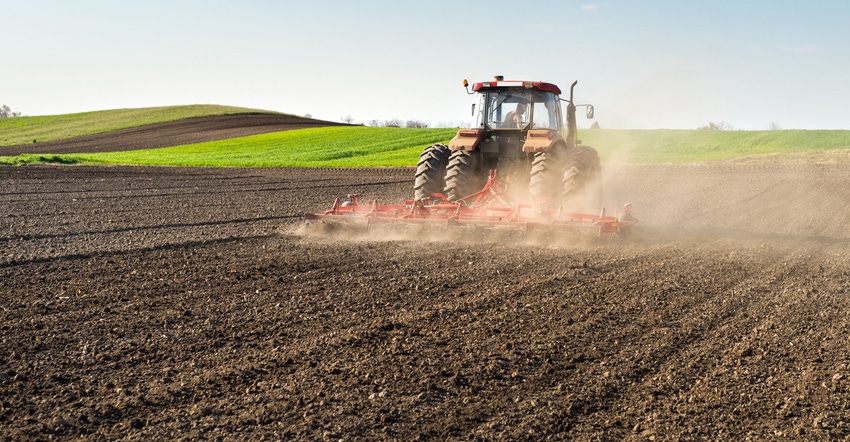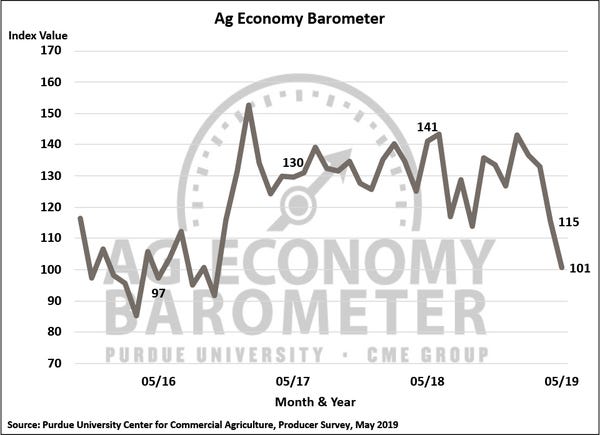Majority of producers still expect a favorable trade outcome for agriculture.
June 5, 2019

Ag producer sentiment dropped to its lowest level since October 2016, erasing all improvements recorded following the November 2016 election, results from the monthly Purdue University/CME Group Ag Economy Barometer showed. Based on a mid-month survey of 400 agricultural producers across the U.S., the barometer declined 14 points in May to a reading of 101, down from 115 in April.

The decline in the barometer came about because producers' perspectives on both current and future economic conditions worsened considerably compared to a month earlier. The Index of Current Conditions fell to a reading of 84, down from 99, and the Index of Future Expectations fell to 108, down from 123.
"Ag producers are telling us the agricultural economy weakened considerably this spring as the barometer has fallen 42 points (29%) since the start of this year," said James Mintert, the barometer's principal investigator and director of Purdue University's Center for Commercial Agriculture. "Farmers are facing tough decisions in the midst of a wet planting season and a lot of uncertainty surrounding trade discussions."
The Large Farm Investment Index, which measures producers' attitudes toward making large investments in their farming operation, has ebbed and flowed over the past year; however, since the beginning of 2019, the index has trended significantly lower. In May, just 18% of farmers stated that it was a "good time" to make large farm investments, while 81% said it was a "bad time," pushing the investment index down to a reading of 37. This is the lowest Large Farm Investment Index reading since the Ag Economy Barometer's October 2015 inception.
According to the results, farmers' optimism toward short- and long-term farmland values has also waned since the early part of 2019. For example, the percentage of farmers who expect farmland values to decline over the course of the upcoming year jumped from 21% in January to 25% in March and most recently to 30% in May. Looking further ahead, just 39% of producers said they expect farmland values to rise over the next five years, compared to 48% who expected rising values in the March survey.
Agricultural trade continues to be a source of concern for producers, the survey found. For the past three months, producers were asked whether they expected the soybean trade dispute with China to be resolved by July 1 and whether they feel the resolution will benefit U.S. agriculture. When the question was first posed in March, 45% of respondents expected the dispute to be resolved by July 1; that number declined to 28% in April and fell further to 20% in May. Regarding whether they ultimately expect an outcome favorable to U.S. agriculture, 77% said “yes” in March, which declined to 71% in April and fell further to 65% in May.
"At this time, a majority of producers still expect a favorable outcome for agriculture to the trade dispute, but that majority appears to be shrinking," Mintert said.
Periodically, the barometer measures whether farmers believe their equity position will improve, diminish or stay the same over the next 12 months. Farmers have not typically been very optimistic regarding future changes in their equity position, with more than one-third of respondents consistently expecting farmer equity to decline. Results of the May survey showed a noticeably more negative view than the last time the question was asked, in February. In May, 55% of respondents said they expect farmer equity to decline over the next year, up from 39% in February and 35% in May 2018.
You May Also Like


.png?width=300&auto=webp&quality=80&disable=upscale)
